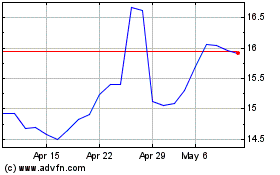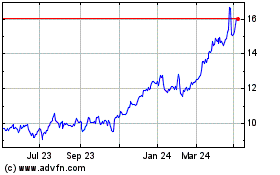By Julia-Ambra Verlaine and Ben Eisen
Deutsche Bank traders in Brooklyn sit side by side while
managers work in glass-enclosed offices. At a Royal Bank of Canada
trading floor in Queens, employees crowd the shared lunch buffet.
JPMorgan Chase & Co. has assigned staffers to hold doors and
press elevator buttons.
Wall Street traders are navigating the wildest market conditions
since the financial crisis. They are doing it on trading floors and
at backup sites dotted throughout the New York City metro area --
the latest coronavirus disaster zone -- worried that they will
catch the virus in crowded offices or while commuting to them.
But as the number of confirmed novel coronavirus cases in New
York skyrockets, a rift is growing between the rank and file and
senior managers, who are trying to preserve liquidity in a fragile
market. A UBS Group AG trader said his wife refused to let him
return to the office. A Goldman Sachs Group Inc. salesperson walked
out of the office in the middle of the day and didn't return.
Markets have melted down at the fastest pace on record, creating
an all-hands-on-deck moment unseen since the financial crisis.
Banks -- like other big employers in the city -- have sent many of
their employees to work from home and closed thousands of retail
branches. But the pandemic poses a logistical challenge on trading
floors designed to facilitate the kind of face-to-face
communication that allows deals to close in seconds.
JPMorgan executives told sales and trading employees they can't
close up shop because the bank makes up at least 20% of the market
in some sectors, according to people familiar with the matter.
Market conditions, they said, would decline markedly were the bank
to shut down its trading floor.
Regulators have eased some of the strict requirements that make
it difficult for traders to work remotely. Still, traders need
multiple computer monitors, recorded phone lines and Bloomberg
terminals -- an environment that is tough to replicate in a home
office.
Typical bank policy has been to split up groups of traders and
send them to multiple locations. The idea is that if the virus
infects staffers at one location, those working at other sites will
be able to keep trading.
Wall Street firms are fielding a flurry of requests to work from
home now that colleagues are testing positive for the virus in
larger numbers.
A Goldman spokesman said the bank encourages employees to work
from home as they see fit. "What matters most is that each of you
do what feels right for you and your family," Chief Executive David
Solomon wrote in a firmwide memo on March 8.
Several employees at JPMorgan's Manhattan headquarters were
diagnosed with the virus last week, according to people familiar
with the matter, including some on the floor where the bank's
equity traders sit. While the bank sent home employees in the same
row as the confirmed cases, staffers across the aisle were told to
stay in the office, the people said.
A JPMorgan spokesman said the bank's protocol goes beyond the
guidance from the Centers for Disease Control and Prevention to
maintain at least 6 feet between employees to reduce the chances of
transmission. "We have spread traders out within floors and across
buildings," the spokesman said.
Deutsche Bank moved traders at its Brooklyn backup site further
apart Monday, according to a person familiar with the matter.
On Bank of America Corp.'s trading floor, word that a colleague
had tested positive for the virus angered employees who wondered
why the lender hadn't told them of the diagnosis or why they
weren't sent home, according to people familiar with the
matter.
The bank's policy when a staffer tests positive is not to spread
the word widely. It informs managers and their employees in the
colleague's immediate area and asks them to quarantine, and deep
cleans the area, a spokeswoman said. She declined to comment on
whether anyone who works on the trading floor has tested positive
for the coronavirus.
For large banks, sending traders home to do their jobs is much
harder than for employees in other parts of the lender. One of the
biggest problems is the phone lines. Sales teams rely on turrets,
two-foot-long switchboards that can field hundreds of client calls,
and they communicate directly with traders around the world over
internal intercoms known as squawk boxes.
While modern turrets are available with remote login capacity,
some banks haven't upgraded them in years.
RBC is working to equip trading staff to work from home, but the
effort is slow going. Meanwhile, traders have been showing up to
work at the bank's Long Island City backup site, where space is
tight for the rank and file, according to a person familiar with
the matter. While the bank allows traders to work from home, some
feel pressured by their managers to stick it out in the office, the
person said.
An RBC spokeswoman said the bank is continually making
adjustments to prioritize health and safety while supporting
clients. "The vast majority of our employees are now working from
home, and we expect that number to increase," she said.
The pandemic also is highlighting a generational divide. For
many veteran traders, making markets when times are tough is just
part of the job. Traders who haven't been through a crisis said
they are routinely reminded of this by their more experienced
colleagues and managers.
Banks have had to scramble in the face of rapidly evolving
situations. Most disaster-recovery plans at banks were designed to
respond to acts of terrorism or natural disasters. After the Sept.
11 terrorist attacks and superstorm Sandy, Wall Street firms leaned
on employees in London and Singapore to pick up the slack. The
coronavirus pandemic marks perhaps the first time nearly every
financial center across the world is simultaneously disrupted.
For smaller shops, it is easier to move operations. Mike
Kerensky, a futures trader at R.J. O'Brien & Associates LLC,
said employees of its New York office have been working from home
since March 16. He and three colleagues set up shop at the
dining-room table in his Long Island home. One of them is staying
over at his house and two others drive out each morning.
"Not 100%," Mr. Kerensky said. "But our clients are very happy
because we are up and running."
At WallachBeth Capital, a trading firm with about 50 employees,
traders now have at-home setups installed. Michael Beth, the head
equities trader, said he prefers to come into the office to handle
the onslaught.
On Friday morning, four people were on their trading floor, well
within the government guidance that no more than 10 people should
congregate at once. Those at the office in Jersey City, N.J., were
in a running video chat with their housebound co-workers.
"You don't even want to get up and use the restroom during the
day," Mr. Beth said. "I'd rather be sitting at the desk and be
watching for any new orders coming in."
--Dana Mattioli contributed to this article.
(END) Dow Jones Newswires
March 24, 2020 11:40 ET (15:40 GMT)
Copyright (c) 2020 Dow Jones & Company, Inc.
Deutsche Bank (TG:DBK)
Historical Stock Chart
From Mar 2024 to Apr 2024

Deutsche Bank (TG:DBK)
Historical Stock Chart
From Apr 2023 to Apr 2024
